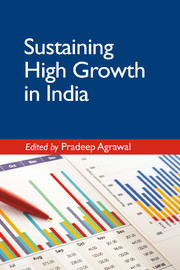Book contents
- Frontmatter
- Contents
- List of Tables
- List of Graphs and Maps
- Preface
- Introduction
- Section 1 Ensuring Macroeconomic Stability for Sustaining High Growth Rates
- Section 2 Promoting Industrial Development for Sustaining High Growth Rates
- Section 3 The International Economic Issues and Sustaining High Growth
- Section 4 Infrastructure Bottlenecks to Sustaining High Growth
- Section 5 Some Socio-political Issues in Sustaining High Growth
- 13 Demographic Dividend and Economic Growth in India and China
- 14 Does Social Cohesion Limit Uncertainties in Economic Growth? A Pre-and Post-reform Analysis from India
- 15 Does Openness and Democracy Reduce Corruption? Results for South Asian Nations and India
- 16 Regional Dynamics of Rural Credit and Growth in India: Exploring Nonlinearity and Convergence in Growth Patterns
- List of Contributors
- Obituary
- Index
16 - Regional Dynamics of Rural Credit and Growth in India: Exploring Nonlinearity and Convergence in Growth Patterns
from Section 5 - Some Socio-political Issues in Sustaining High Growth
Published online by Cambridge University Press: 08 February 2018
- Frontmatter
- Contents
- List of Tables
- List of Graphs and Maps
- Preface
- Introduction
- Section 1 Ensuring Macroeconomic Stability for Sustaining High Growth Rates
- Section 2 Promoting Industrial Development for Sustaining High Growth Rates
- Section 3 The International Economic Issues and Sustaining High Growth
- Section 4 Infrastructure Bottlenecks to Sustaining High Growth
- Section 5 Some Socio-political Issues in Sustaining High Growth
- 13 Demographic Dividend and Economic Growth in India and China
- 14 Does Social Cohesion Limit Uncertainties in Economic Growth? A Pre-and Post-reform Analysis from India
- 15 Does Openness and Democracy Reduce Corruption? Results for South Asian Nations and India
- 16 Regional Dynamics of Rural Credit and Growth in India: Exploring Nonlinearity and Convergence in Growth Patterns
- List of Contributors
- Obituary
- Index
Summary
INTRODUCTION
In the face of increasing internationalization of the world economy, the development strategies of both developing and developed countries are also changing rapidly. Developing countries, such as India, have undertaken a series of reforms in order to shrink the growth gap and facilitate convergence between both sides of development. Although one would naturally expect that the implemented reforms would beget high growth trends, the eventual growth consequences may be illusory. First, all undertaken policies (such as financial reform) may not have a broader reach among masses – in the rural sector in particular – if there is a frequent change of political fortunes and strategic intervention with respect to timing of election. Second, even if endogenous policy decisions can significantly improve overall economic performances, it can be seriously thwarted if exogenous factors, such as lack of rainfall, affect (agricultural) productivity growth. Indeed, some exogenous factors occur infrequently and leave a long-lasting effect on the growth trajectory of the economy. However, rainfall as an exogenous determinant affects both productivity and growth in cycle, year after year and may impede growth to a significant extent unless strong counter cyclical policies are adopted to tackle such growth slide. The constant tussle between endogenous (in terms of effective policy intervention) and exogenous (here in terms of insufficient rainfall) growth determinants is a subject of intense scrutiny both in theoretical and empirical growth literature. However, the magnitude of its implications bears understandable weight for developing economies, especially India which enjoys the effects of constant political chaos as well as whim of rainfall that produces cycles of low productivity in rural sector. Although this issue has been frequently discussed in various policy forums, an in-depth analysis of their dynamic relationship is sparse. This forms the core of the analysis of this chapter.
To understand their complex linkage, it is necessary to know how the existing literature has treated the interrelationship among financial development, economic growth, political intervention, and rainfall and how they have understood the development trajectory from this perspective. It is now well recognized that the development of the financial system (or financial deepening) supports the rate of growth of an economy that is particularly dependent on the non-traditional sector.
- Type
- Chapter
- Information
- Sustaining High Growth in India , pp. 489 - 524Publisher: Cambridge University PressPrint publication year: 2017



